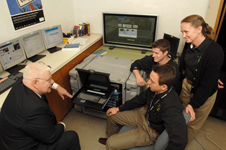INFORMATION
Computer in Education
A variety of societies, organizations and cooperatives provide networking and communities for those involved in computer education. Many of these organizations sponsor conferences to disseminate information to participants, provide open opportunities for sharing methods and technological advances and present opportunities for peer interaction. Most states have their own educational technology associations, the United States Department of Education has an office of educational technology and some teacher organizations have branches for the official study and promotion of computer education. The American Association of School Librarians considers technology an integrated part of both library education and literacy and have developed 21st-century learning standards to share beliefs about effective technology teaching and learning. There are also some international organizations dedicated to maintaining a vision for school technologies, the most notable of which is ISTE (the International Society for Technology Education). ISTE created and updates the NETS (National Educational Technology Standards) that are often the basis for the technology guidelines and policies enacted by individual school districts.
Computer in Education
A variety of societies, organizations and cooperatives provide networking and communities for those involved in computer education. Many of these organizations sponsor conferences to disseminate information to participants, provide open opportunities for sharing methods and technological advances and present opportunities for peer interaction. Most states have their own educational technology associations, the United States Department of Education has an office of educational technology and some teacher organizations have branches for the official study and promotion of computer education. The American Association of School Librarians considers technology an integrated part of both library education and literacy and have developed 21st-century learning standards to share beliefs about effective technology teaching and learning. There are also some international organizations dedicated to maintaining a vision for school technologies, the most notable of which is ISTE (the International Society for Technology Education). ISTE created and updates the NETS (National Educational Technology Standards) that are often the basis for the technology guidelines and policies enacted by individual school districts.
Print Resources
- In order to stay current with computer education, there are a variety of sources that educators can utilize to learn more about the importance of educational technology. Major library and technology organizations produce journals and magazines to share information on research, trends and standards in education; some magazines provide ideas for successful technology integration and implementation. Examples of print sources include Multimedia & Internet @ Schools Magazine, Tech & Learning Magazine and the Journal of Technology Education.
Electronic Sources
- Much information on computer education can be found on the Internet. While computer education magazines, programs and organizations often maintain websites to share information, there are many additional sources out there that provide information about the successful use and problems of using technology in schools. Teachers who use technology often blog about their experiences, share ideas on community sites or maintain listservs to share information about technology conferences and other learning opportunities.
College Programs
- Many college computer education programs offer free lectures, seminars and newsletters about research in and the successful implementation of computer technology. Many such programs maintain websites to share the latest information with educators and prospective technology teachers. Individuals who are involved with or interested in computer education often enter college distance-learning programs specializing in educational technology in order to prepare for the successful implementation of technology into classrooms, to become technology teachers or to stay current with new methods of technology education.
Professional Learning Communities
- Professional learning communities are networks of individuals who stay connected and work together toward a common educational goal. Many learning communities are formed in order to help members stay informed about technology and discuss issues related to its implementation. Professional learning communities may exist inside the school building or be district-wide or regional in order for those involved to gain many different perspectives on technology teaching and learning.
Computer in EducationComputer in EducationComputer in EducationComputer in EducationComputer in EducationComputer in EducationComputer in EducationComputer in EducationComputer in EducationComputer in Educationcomputers & information technology career school
Computer & Information Science @ IUPUI School of Science










No comments:
Post a Comment